Class 9 Maths Chapter 10 Question Answers - Heron’s Formula
Q1: Find the area of a triangle whose sides are 11 m, 60 m and 61 m.
Ans:
Let a = 11 m, b = 60 m and c = 61 m :
Firstly, to calculate semi perimeter (s)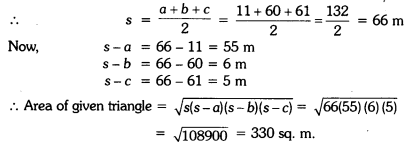
Q2: Suman has a piece of land, which is in the shape of a rhombus. She wants her two sons to work on the land and produce different crops. She divides the land in two equal parts by drawing a diagonal. If its perimeter is 400 m and one of the diagonals is of length 120 m, how much area each of them will get for his crops ?
Ans:
Here, perimeter of the rhombus is 400 m.
∴ Side of the rhombus = 400/4 = 100 m
Let diagonal BD = 120 m and this diagonal divides the rhombus ABCD into two equal parts.

Hence, area of land allotted to two sons for their crops is 4800 m2 each.
Q3: The perimeter of a triangular field is 144 m and its sides are in the ratio 3:4:5. Find the length of the perpendicular from the opposite vertex to the side whose length is 60 m.
Ans:
Let the sides of the triangle be 3x, 4x and 5x
∴ The perimeter of the triangular field = 144 m
⇒ 3x + 4x + 5x = 144m
⇒ 12x = 144m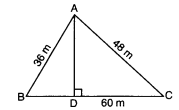
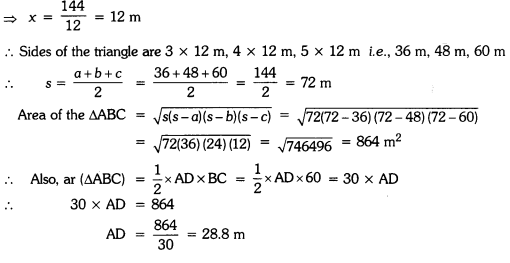
Q4: Find the area of the triangle whose perimeter is 180 cm and two of its sides are of lengths 80 cm and 18 cm. Also, calculate the altitude of the triangle corresponding to the shortest side.
Ans:
Perimeter of given triangle = 180 cm
Two sides are 18 cm and 80 cm
∴ Third side = 180 – 18 – 80 = 82 cm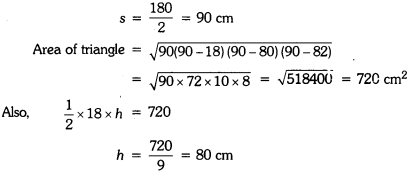
Hence, area of triangle is 720 cm2 and altitude of the triangle corresponding to the shortest side is 80 cm.
Q5: Calculate the area of the shaded region.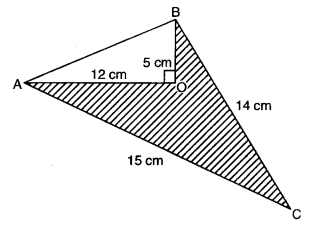 Ans:
Ans: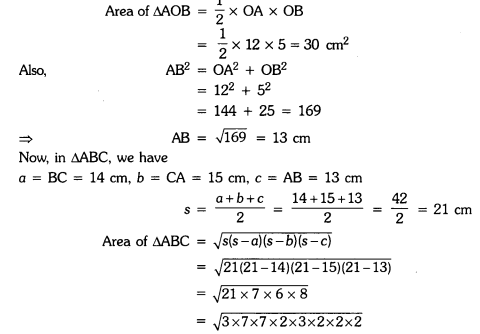
= 2 × 2 × 3 × 7 = 84 cm2
Area of shaded region = Area of ∆ABC – Area of ∆AOB
= 84 cm2 – 30 cm2 = 54 cm2
Q6: The sides of a triangular park are 8 m, 10 m and 6 m respectively. A small circular area of diameter 2 m is to be left out and the remaining area is to be used for growing roses. How much area is used for growing roses ? (use n = 3.14)
Ans:
The sides of the triangular park are 8 m, 10 m and 6 m.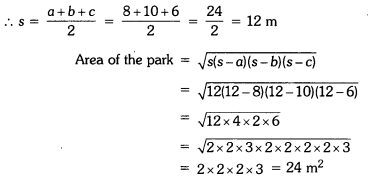
Radius of the circle = 2/2 = 1 m
Area of the circle = πr2 = 3.14 × 1 × 1 = 3.14 m2
∴ Area to be used for growing roses = Area of the park – area of the circle
=> 24 – 3.14 = 20.86 m2
|
44 videos|412 docs|54 tests
|
FAQs on Class 9 Maths Chapter 10 Question Answers - Heron’s Formula
| 1. What is Heron’s Formula and how is it derived? |  |
| 2. How can I use Heron’s Formula to find the area of a triangle with side lengths 7, 8, and 9? |  |
| 3. Can Heron’s Formula be applied to any type of triangle? |  |
| 4. What are the limitations of using Heron’s Formula? |  |
| 5. Is there a relationship between Heron's Formula and other area calculation methods for triangles? |  |

|
Explore Courses for Class 9 exam
|

|


















